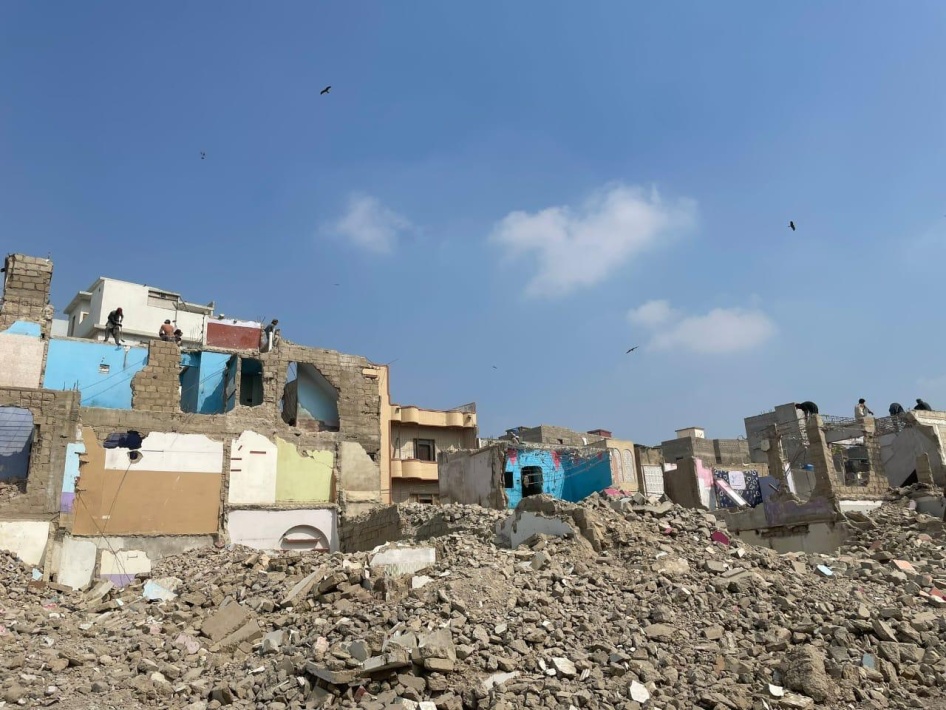- Pakistani authorities frequently use colonial-era laws and policies to forcibly evict low-income residents, shop owners, and street vendors to enable public and private development projects.
- The evictions disproportionately affect the most economically and socially marginalized communities in Pakistan without resettlement assistance or means of redress.
- The Pakistani government needs to reform its land laws and ensure that no one is made homeless due to eviction, and that there are adequate compensation and resettlement options.
(New York) – Pakistani authorities frequently use colonial-era laws and policies to forcibly evict low-income residents, shop owners, and street vendors to enable public and private development projects, Human Rights Watch said in a report released today.
The 48-page report, “‘I Escaped with Only My Life:’ Abusive Forced Evictions in Pakistan,” documents widespread and abusive forced evictions that disproportionately affect the most economically and socially marginalized communities in Pakistan. The authorities have evicted thousands of people without adequate consultation, notice, compensation, resettlement assistance, or means of redress in violation of their basic rights.
“The Pakistani government urgently needs to reform its colonial-era land laws so that they are equitable, transparent, and in line with Pakistan’s international obligations,” said Saroop Ijaz, senior Asia counsel at Human Rights Watch. “The authorities should ensure that no one is made homeless due to eviction, compensate the loss of land, and provide for the resettlement of those displaced.”
Human Rights Watch interviewed 36 victims of forced evictions in the cities of Lahore, Islamabad, and Karachi, as well as lawyers advocating for the rights of those evicted and urban planners, and reviewed court decisions and laws governing Pakistan’s land tenure system.
In the vast majority of mass eviction cases documented, the authorities failed to provide adequate consultation, notice, and a means of redress. During many evictions the police used unnecessary or excessive force to remove tenants, including beatings, arbitrary arrests, and destruction of personal property. The government’s promotion of the development projects as serving important public functions does not lessen the avoidable harm to those affected or the government’s international legal obligations to address those harms.
Many of those evicted, in addition to losing their homes, frequently lose their livelihoods and access to essential public services, such as schools and health care. These practices worsen social and economic inequalities, disproportionately burdening people and households with low incomes, and who often are ethnic minorities.
Pakistan’s colonial-era Land Acquisition Act of 1894 has provided the template for public land acquisition in the country more than a century later. The law permits Pakistani authorities to acquire land for vaguely defined “public purposes,” which may include use by public-private partnerships and even private, for-profit companies. The law and others based on it gives the government almost exclusive authority to decide what falls within its scope and to displace people with minimum procedural safeguards that are contrary to international human rights law and standards.
The government frequently asserts that removing structures that “encroach” on public lands or state property is both necessary and justified. Encroachment is also a crime under several provincial and regional laws, and those convicted face fines or even prison sentences.
But interviews with those who have been forcibly displaced in such operations indicate that there is little consistency and often less rationale behind the use of anti-encroachment as a justification for evictions. In one example, the family of Bashir Husain had been running a small shop in a Karachi market for 70 years and paid timely rent to the local government municipal corporation, as well as utility bills and taxes. But in 2018, the authorities demolished Husain’s family shop as part of an anti-encroachment drive. “How can my shop be an encroachment?” he said. “Since the 1950s we have paid rent to the government. How long does it take for something not to be an encroachment? Three generations of my family have run this shop.”
Governments are empowered to expropriate land, including evicting people from their property, for the public interest and other exceptional circumstances. However, to be lawful, evictions must be carried out in accordance with domestic law, and international human rights law and standards. International law defines a “forced eviction” as “the permanent or temporary removal against their will” of individuals, families, or communities from homes, business premises, or land “without the provision of, and access to, appropriate forms of legal or other protection.”
Human Rights Watch found that the authorities frequently fail to ascertain land rights of residents beforehand and provide little if any compensation. In some cases, the police arrest and prosecute those who resist without a lawful basis. Other contributing factors that facilitate abuse include corruption in land acquisition; impunity for police who carry out abusive evictions; and poor land registration mechanisms that make it difficult for victims of forced evictions to prove ownership.
Some Pakistani authorities have attempted to address the problem; in January 2023 the Sindh provincial government enacted the Sindh Resettlement and Rehabilitation Policy 2022, Pakistan’s first. However, the real test is ensuring that the policy is carried out effectively, Human Rights Watch said.
“Pakistan’s government should ensure that projects intended to benefit the population are achieved hand-in-hand with the law,” Ijaz said. “Any necessary resettlements should be planned and carried out in a lawful and orderly way that respects people’s rights to housing, livelihoods, and safety.”








